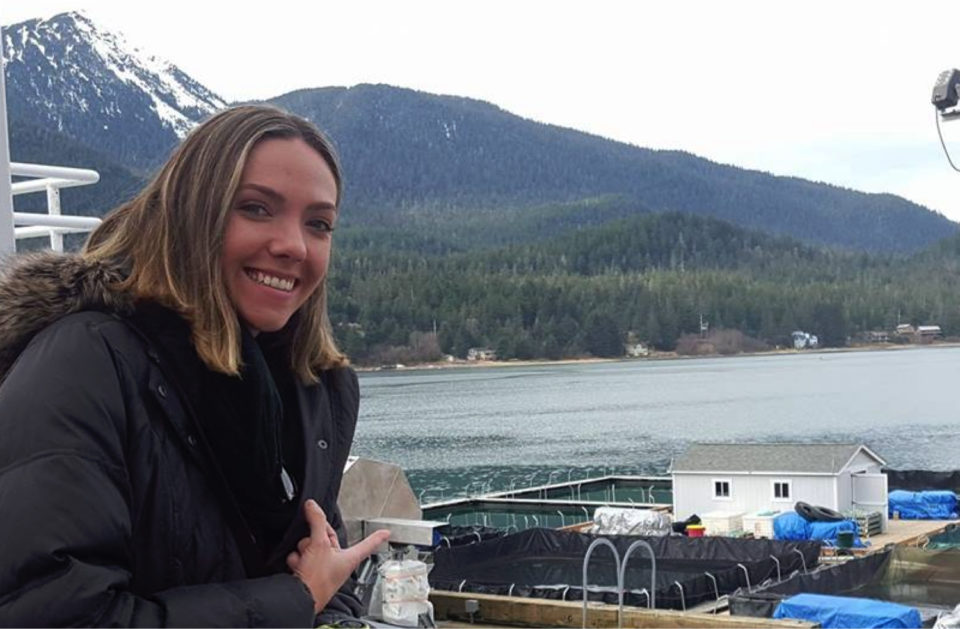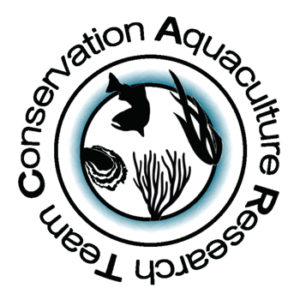Newly formed group aims to bridge knowledge gaps between aquaculture, climate change and larger food systems

Aquaculture is growing rapidly globally, but ecological science and conservation around aquatic farming have not kept pace.
Aquaculture now produces more edible biomass than either wild seafood or beef, making it a central part of our global food system. Substantial efforts and investments have been made to align agriculture and fisheries with conservation objectives, yet few such steps have been taken for aquaculture. The Conservation Aquaculture Research Team (CART) wants to change that.
Based at the National Center for Ecological Analysis and Synthesis (NCEAS) in Santa Barbara, Calif., USA, CART is the next phase of the recently completed Science for Nature and People Partnership (SNAPP) Sustainable Open-Ocean Aquaculture Expert Working Group.
As CART co-founders Dr. Ben Halpern and I (Dr. Halley Froehlich) lead scientists on the SNAPP working group, we see the potential for science to do more and go further. Through the use of synthesis science and continued collaborations with global partners – including The Nature Conservancy (TNC) and the National Oceanic and Atmospheric Administration (NOAA) – CART builds off SNAPP research to explore critical and understudied aspects of aquaculture and the environment across ecosystems.
We see CART’s primary mission as bridging the scientific gap in understanding between aquaculture, climate change and larger food systems to inform policy and help align seafood production with conservation objectives. Some of our upcoming research begins to quantify the implications of changing ocean conditions (e.g., warming temperatures and ocean acidification) for aquaculture, as well as linkages to the terrestrial environment through feed (e.g., soy), all while considering local- to global-scale conservation issues on land and in the oceans.
CART is the new face of aquaculture science – a scientific startup created by scientists leveraging key partnerships in order to drive progress in a field that has garnered less attention.
While we have great scientific aspirations for CART, the collaboration between organizations, like TNC and NOAA, are paramount. Through new and existing partnerships we intend to have our science go beyond publications to reach the public, policy makers and industry. We’re surrounding ourselves with on-the-ground experts to help identify key questions and move the science forward in the real world.
CART is the new face of aquaculture science – a scientific startup, of sorts, created by scientists leveraging key partnerships in order to drive progress in a field that has garnered less attention. It takes substantial support from agencies and organizations for science to inform decisions and have an impact. We hope to be a key part of that impact by creating a connection point of new and innovative science with people and organizations across the intersecting fields of aquaculture, fisheries and conservation, on land and in the oceans.
For more information please visit our website.
Now that you've finished reading the article ...
… we hope you’ll consider supporting our mission to document the evolution of the global aquaculture industry and share our vast network of contributors’ expansive knowledge every week.
By becoming a Global Seafood Alliance member, you’re ensuring that all of the pre-competitive work we do through member benefits, resources and events can continue. Individual membership costs just $50 a year. GSA individual and corporate members receive complimentary access to a series of GOAL virtual events beginning in April. Join now.
Not a GSA member? Join us.
Author
-

Halley E. Froehlich, Ph.D.
Postdoctoral Researcher
National Center for Ecological Analysis & Synthesis
University of California, Santa Barbara
Tagged With
Related Posts

Innovation & Investment
After half a century, Auburn’s Claude Boyd to ‘retire’
Friends, colleagues and former students of longtime Auburn University Professor Claude E. Boyd, Ph.D., don’t expect the Mississippi native to slow down, despite the quiet announcement of his retirement earlier this month. The 50-year veteran researcher’s career has been truly extraordinary.

Health & Welfare
Big shoes to fill: Dhar takes reins at shrimp pathology laboratory
Arun Dhar, Ph.D. will attempt to fill the “big shoes” of Dr. Donald Lightner at the University of Arizona’s Aquaculture Pathology Laboratory, where the shrimp disease EMS was diagnosed.

Innovation & Investment
Better together: Partnerships drive innovation at leading labs
Laboratories with industry partnerships are making aquaculture more innovative, efficient and responsible. These collaborations offer access to expertise, facilities and funding to further the industry and improve global food security.

Aquafeeds
Aquaculture Exchange: Giovanni Turchini, Deakin University, part 1
One of the world’s leading fish nutrition experts talks about how aquaculture can learn to survive, and even thrive without depending on fishmeal and fish oil. It’ll take a lot of innovation, but Giovanni Turchini is confident that the industry is on the right path.

